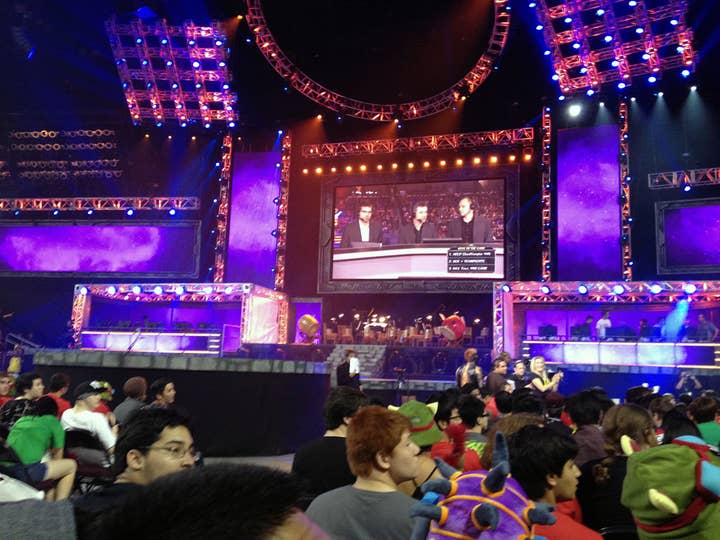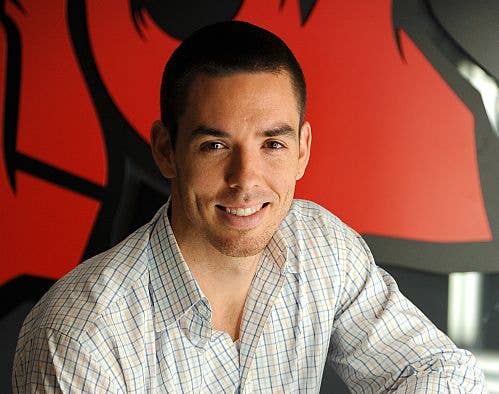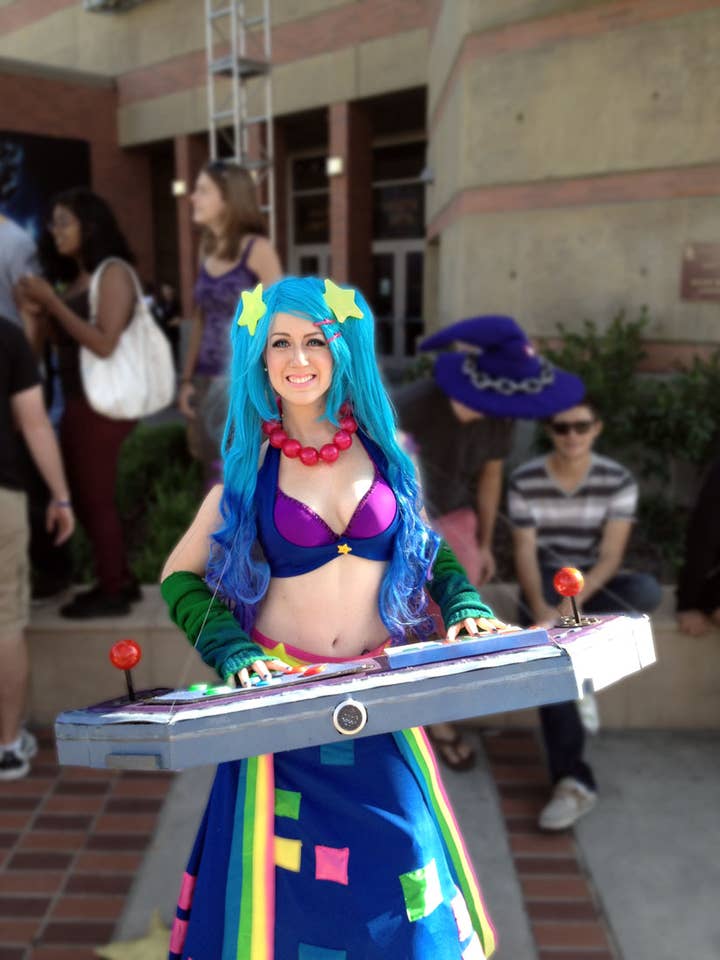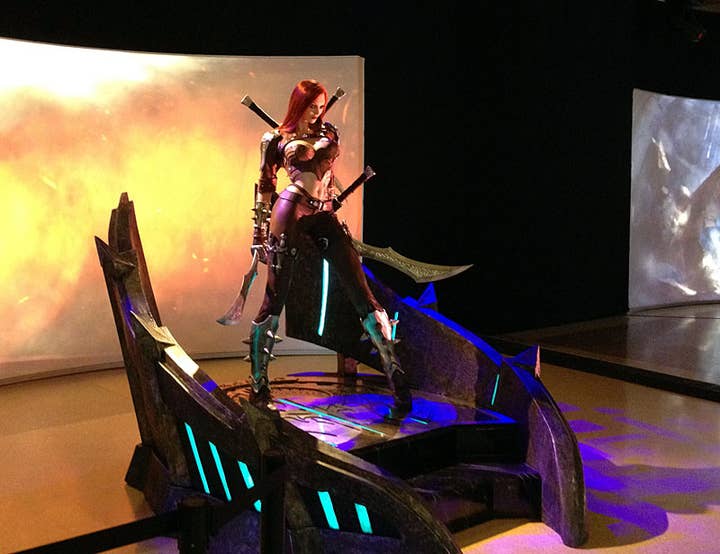League of Legends and Riot's Play for Global Domination
CEO Brandon Beck details the latest impressive data while President Marc Merrill talks to us about future plans
Riot Games brought the press in to its Santa Monica headquarters prior to the World Championship match last week, providing an inside look at some of the work behind League of Legends. CEO Brandon Beck and President Marc Merrill, co-founders of Riot Games, took some questions from the assembled press. Afterwards, GamesIndustry International was able to grab a few moments with Merrill to ask about Riot's future.
Riot laid out some impressive numbers on its user base last week: 70 million registered player names, with 32 million MAU (monthly active users) and 12 million DAU (daily active users). Compare those figures to the most popular Facebook game currently, FarmVille 2, with 48 million MAU and 8.7 million DAU. By hours played per month, Riot claims that League of Legends is the most played video game in the world. According to Riot, on average some two percent of the entire population of Taiwan is playing League of Legends at any given moment. Of course, the key pieces of information are the conversion rate (from a free player to a paying player) and the average revenue per paying user. Merrill said in response to that direct question, "Honestly, I don't know those precise numbers off-hand. But I wouldn't say them if I did."

Beck said that the popularity of League of Legends is not just online; 20,000 people showed up for a friendly match in Taipei. While e-sports in Korea have already become an accepted part of the culture, Beck feels "it will just take time" for e-sports to reach that level of acceptance in other regions. Getting non-players to watch is "not a priority," according to Beck. He's most interested in serving the existing audience. "We lose money on the tournaments, but we think they will benefit all e-sports. We want to deliver value to players," Beck said. Will there be a TV deal someday? "You never know," Beck said with a smile.
"We lose money on the tournaments"
Brandon Beck
One of the big changes in e-sports, and for League of Legends in particular, is that it's now become a full-time job for the top players, and one that pays well. Prize money and endorsements are part of that, but the revenue from streaming is the biggest component. Many of the top players take in over $100,000 annually from streaming their games. Advertisers pay to have their ads shown with the stream, and the players get the biggest percentage of that revenue. Adding to that, Riot Games announced that all the members of the teams that made the semi-finals (40 players) would be receiving a $30,000 salary for the next year, in addition to any prize money they won.
Now that players can actually make a living from e-sports, what's the next step in increasing the credibility of e-sports? Merrill feels that increasing the credibility isn't Riot's primary concern. "The credibility of e-sports varies by territory," he noted. "Our priority is to give players and fans a great experience both live and streaming. We want to approach the quality of pro sports in our competitions and broadcasts - that will improve credibility."
Riot gave presentations on the art, the animation and the music of League of Legends, showcasing the enormous effort that is going into those areas. Champions now have an opening animation with their own musical score. Riot is even developing incredibly detailed images of the various places where their Champions live, which they have not shown before to anyone. The amount of effort described goes far beyond what's necessary to provide the art and animations seen in the current game. It makes you wonder if Riot is planning for a roleplaying game, or a movie, or perhaps an animated series. Given the enormous scale of the game and its fan base, any of those would seem possible.
Riot is still laser-focused on League of Legends, with the constant release schedule of a new Champion every two to three weeks continuing unabated. Now that Season 2 has ended, fans are beginning to look forward to Season 3, which has yet to launch. Details are forthcoming, but it seems logical to expect an even bigger prize pool, more events, and perhaps more attention from the general media.
GamesIndustry International spoke exclusively with Riot President Marc Merrill about new platforms, new games, and future plans for Riot.

Riot's been moving at a steady clip since the studio released League of Legends in 2009. "Our initial target was 20,000 concurrent users," noted Merrill. "We built solutions with that in mind, and then we've had to play catch-up for three years." As of July, there were 3 million concurrent players on a regular basis, far beyond the 20,000 initially envisioned. The rapid growth of the player base has left Riot perpetually scrambling to meet the demands of the audience. The focus of the company has been supporting the growth of the audience, expanding the game, and trying to make the game as good as possible for the players. That's left the marketing and communications functions as a lower priority, explaining the relative paucity of traditional PR and marketing efforts. Why spend money and time on marketing when you can barely keep up with player growth as it is?
At some point, though, sooner or later, League of Legends will reach the maximum number of addressable players, right? "Every month our audience continues to grow, so it hasn't stopped yet," said Merrill. "We continue to develop our audience worldwide, gaining expertise with different markets." That's fine for now, but eventually the League of Legends audience will stop growing. What then? How does the company grow from that point? "We want to make the 's' in Riot Games mean something," noted Merrill. "We feel our direct distribution and our connection to customers, along with our experience around the world, is a very powerful asset we intend to capitalize on when it makes sense."
"We want to make the 's' in Riot Games mean something"
Marc Merrill
As usual, Merrill wouldn't be more specific about plans for future games. Riot does recognize the deep desire of fans to know more about what the company has planned. "Soon," Merrill said. "You just have to say that. We are working on so many different things. We feel the pressure from fans, but we want to release things when they are ready."
With the millions of intensely loyal fans, why hasn't Riot put out a slew of merchandise and licensed products? Fans would probably buy vast quantities of action figures, posters, and more. Rovio makes over a third of its revenue from Angry Birds merchandise with only a few characters; League of Legends has over 100 characters. "It's lower on our priority list," said Merrill. "We realize people really want merchandise, but we don't want to put our IP into the hands of a third party that might take the IP in directions we don't like."
That is a potential problem with licensing, especially if you allow new stories to be created for your characters. Riot does have a plan, though. "We have a tremendous creative team in-house," said Merrill. "We can grow our IP organically to make sure it doesn't get out of hand."

Every two to three weeks Riot releases a new Champion for League of Legends, and the total roster of playable Champions is now over 100. Merrill admitted that it gets harder to balance each new Champion as the number continues to climb. Will Riot hit a limit with the number of new Champions the team can introduce and still have the game balance properly? "We think the limit is much higher," said Merrill. "We have a long way to go." Riot has more designers working on the balance issues, he noted, and while the task of balancing the game is getting more difficult, at the same time they're getting better at the process.
League of Legends has been growing in popularity in China, and the conventional wisdom is that Chinese gamers like to buy power in their free-to-play games. League of Legends stays away from that, only allowing players to purchase new Champions and skins rather than more power in the game. "We didn't change it for China," said Merrill. "We know many people say that buying power is something some people do in China, but we feel our way is better in the long term."
PC gaming is all well and good for League of Legends, but the elephant in the room is tablets. Will Riot someday extend League of Legends to other platforms, like consoles or tablets? "The controls are just not there on platforms other than the PC," insisted Merrill. "The nature of the game would have to be different. The infrastructure of consoles is so different; we couldn't push out constant updates and changes, or have that direct communication and feedback that is so crucial to our success." Still, Merrill admits that Riot's watching the growth of mobile platforms closely, and keeping an eye on developments in the console market as well.

